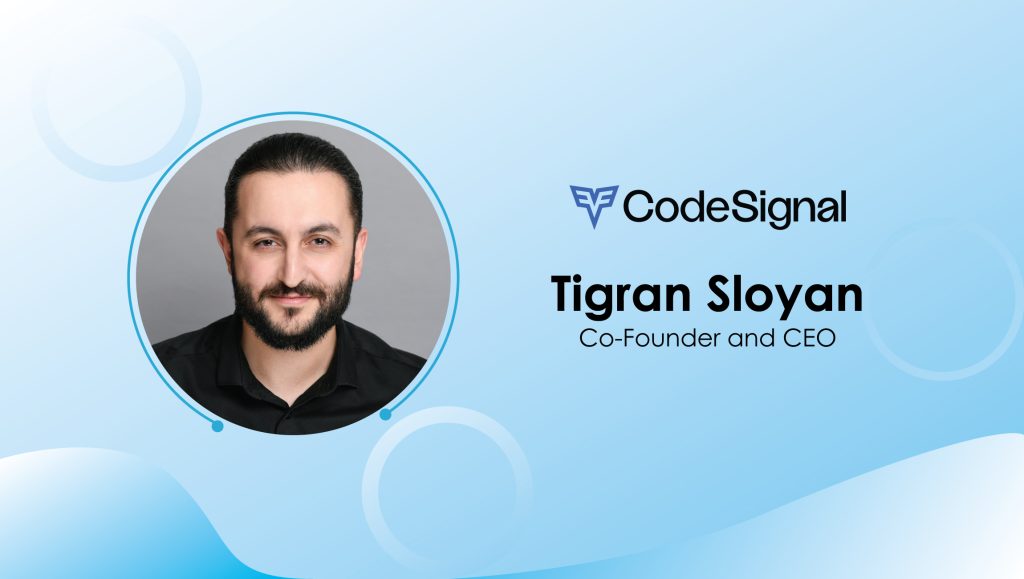What should B2B technology sales leaders keep in mind when hiring for new sales roles? Tigran Sloyan, Co-founder and CEO at CodeSignal weighs in:
__________
Hi Tigran, tell us about yourself and more about your time in the B2B tech market and role as CEO at CodeSignal?
Of course, thank you for having me today. I’m Tigran Sloyan, Co-founder and CEO of CodeSignal, a leading skills platform that empowers teams and individuals to discover and develop the skills shaping the future. My academic background in Mathematics, Computer Science, and Economics from MIT provided a strong foundation, but it was my hands-on experience in tech roles that shaped my understanding of the talent evaluation landscape. From early roles as an engineer to product management positions at companies like Google, I saw firsthand how hiring practices often fail to identify the best talent. Traditional methods tend to rely on resumes and credentials, which don’t always capture a candidate’s true abilities.
This realization led me to co-found CodeSignal in 2015. At CodeSignal, we’re building tools to make hiring more objective, efficient, and fair by evaluating candidates based on their skills. It’s a mission I’m passionate about because we’re helping companies uncover talent that might otherwise be overlooked, and we’re giving candidates a chance to show what they’re truly capable of.
CodeSignal’s latest interview solution for sales teams is meant to boost the sales hiring cycle: please can you share more about your top features and how this is an enabler?
Absolutely. Our AI Interviewer for Sales is tailored specifically to meet the fast-paced needs of sales hiring. The goal is to enable hiring teams to quickly identify candidates with the right skills for success in sales roles — something that can be challenging to gauge from a resume alone.
Three core features stand out:
- First, we offer customizable interview content, enabling companies to input their own sales scenarios and questions. This is important because sales is highly context-specific, and companies need to assess candidates in a way that aligns with their unique approach.
- Second, we use real-life simulation technology, enabling hiring teams observe how candidates handle real conversations, whether it’s value selling, persuasion, or discovery.
- Lastly, candidate reports provide detailed insights into each candidate, ranking them across key sales competencies, such as value selling and coachability. This makes the evaluation transparent and data-driven, helping sales leaders make better decisions faster and giving candidates a consistent and fair interview experience.
By creating tailored, data-driven hiring processes powered by AI, sales teams can ensure they are hiring top talent with the skills that matter most, while maintaining a consistent interview experience and saving time for sales leaders.
Read More: SalesTechStar Interview with Monica Lewis, VP of Product Management at LinkedIn
What about the state of modern B2B tech sales hiring needs to change?
In today’s tech sales world, traditional hiring methods just don’t cut it. Hiring based on degrees or past job titles often overlooks real capabilities, especially in sales roles where skills like persuasion, adaptability, and value selling make the difference between average and top performers. Companies need to adapt by focusing on what candidates can actually do, rather than what’s written on their resumes. By using AI-powered tools to evaluate skills directly, sales teams can identify high-potential candidates much faster, ensuring they are hiring top talent with the skills they need to meet business needs.
What type of challenges do sales leaders often come across when building out sales teams and hiring for new Sales roles?
Sales leaders face a twofold challenge: finding talent with the right skills and keeping them engaged in a highly competitive landscape. Data from Salesforce shows that 57% of sales leaders and managers say competition has increased since last year and it’s even harder to find candidates with the right skills. Turnover in sales is a significant issue, with rates often three times higher than in other roles, which can cost companies heavily in both time and resources. To tackle this, the first step is adopting a skills-focused hiring approach that identifies candidates who aren’t just technically qualified but are also a strong fit for the team and culture.
At CodeSignal, we see that hiring based on skills, rather than credentials alone, allows teams to better match candidates to the demands of the role and the team dynamics. Once the right fit is in place, retention becomes about nurturing that talent. Sales leaders can reduce turnover by offering ongoing training, skill-building opportunities, and clear paths for career progression. When employees see that they’re growing within the company and adding value, they’re more likely to stay engaged and contribute to long-term success.
Can you talk about some of the various ways in which sales leaders can enable better hiring policies and practices with AI?
Definitely, there are so many ways AI can contribute to building more efficient hiring practices for sales teams. Most importantly, leveraging AI helps ensure the interview process is consistent across candidates and addresses specific business goals and requirements. For example, traditional hiring practices often rely on sifting through resume applications and hand-picking who moves on to the interview round. Then, in the interview phase, the hiring manager may have a specific set of questions based on each person’s application as opposed to what qualities/skills are required for the specific role. By using AI-powered interview tools like our AI Interviewer for Sales, hiring teams can customize their interview questions and develop realistic test scenarios to ensure each applicant receives the same consistent interview process, which ladders up to unique business needs. This impacts the overall efficiency and speed of the hiring process, including saved time for sales leaders and higher quality hires.
A few parting thoughts you’d share with anyone in sales leadership looking to scale and expand their sales team, across the hierarchy?
My final piece of advice is to view AI as a valuable partner, not a threat. The best sales leaders will be those who see AI as a way to enhance, not replace, human capabilities and make smarter, more objective decisions. Embracing AI will enable sales leaders to build adaptable, future-proof teams who are well-equipped to thrive as the industry continues to evolve. By using technology to your advantage, you can create a culture of innovation and continuous improvement that will support sustainable success across your organization.
Read More: Mid Funnel Sales Content in B2B Sales: What Works Best?
CodeSignal is how the world discovers and develops the skills that will shape the future. Our skills platform empowers teams to go beyond skills gaps, with hiring and AI-powered learning solutions, and helps individuals cultivate the skills they need to level up. Wherever you are on your journey, CodeSignal’s technical hiring and learning & development solutions meet you there and get you where you need to go. Having powered millions of skills evaluations, CodeSignal is trusted by leading companies like Netflix, Capital One, Meta, and Dropbox, and is used by learners across the globe.
Tigran Sloyan is the Co-founder and Chief Executive Officer of CodeSignal, the leading skills platform empowering teams and individuals to discover and develop the skills that will shape the future. Tigran is a recognized voice in the industry—a TED speaker, active Forbes Technology Council member, frequent keynote, and contributor to major publications. He is passionate about the intersections of technology, education, and talent acquisition, and his innovative insights are regularly featured in Forbes, Fast Company, Morning Brew, and more.





















